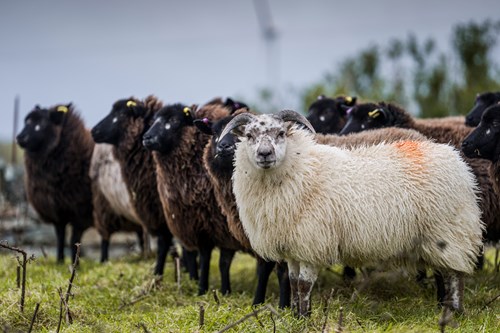Trace Elements for Sheep

The need for trace element supplementation can vary considerably from area to area and even from farm to farm depending on the soil and geology, and to a lesser degree to breed or cross of sheep being run. You should discuss this with your vet and consider getting blood samples checked from a representative batch of sheep from your flock.
In Shetland, for example, there is generally a lack of both copper and cobalt. Selenium can be an issue particularly if barley treated with propionic acid is being fed. Mineralised feeds can be all that is required if the deficiencies are slight but in many cases trace elements needs to be supplemented throughout the year.
Cobalt
Cobalt can be given as tablets or as a liquid supplement, but both tend to be effective only for a period of four to six weeks. Your vet can supply the liquid supplementation contained in your worm drench. This is a very cost-effective treatment particularly when treating lambs, cobalt can also be applied to the soil (2kg/ha cobalt sulphate) which can last around three to four years. Only 50% of the area being grazed by sheep needs to be treated so it is possible to split your parks into quarters treating each quarter once every eight years on rotation. This takes quite a bit of planning, and the cost of cobalt sulphate can vary considerably year to year.
If you need to supplement cobalt in your breeding flock, then the use of a bullet or bolus is worth considering. Cobalt only bullets are usually available, as are alternatives with cobalt in combination with other trace elements. A cobalt bullet is generally meant to cover six months, but many crofters and farmers only give one bullet per year in the back end to cover the sheep through pregnancy and over lambing. If the deficiency is severe, you many need to give more than one per year. This should be discussed with your vet and ideally be decided based on blood sample results.
I am also aware of units in Shetland where cobalt bullets were only ever given to replacement ewe lambs to cover them through their first winter and not to the main flock. This would cover them during a period of rapid growth but would only be worth considering if the lack of cobalt was slight rather than severe.
Copper
Sheep also frequently suffer from a lack of copper. If ewes are deficient in mid-pregnancy frequently that can result in (but not always) swayback in the lambs. Copper deficiency can be a lack of copper in the grazing, forage and feed but can also be a result of an excess of elements such a molybdenum, iron or sulphur blocking the sheep’s ability to absorb copper.
The margin between copper deficiency and toxicity in sheep is very small, which is why copper can only be administered to sheep under prescription from a vet. A combination of blood and soil sampling (livestock package) can be used to determine the extent and cause of any copper deficiency issues.
For copper deficiency the longer acting treatment is the use copper oxide needles applied in a capsule. The capsules dissolve and the needles lodge in the folds of the rumen gradually breaking down to release copper into the sheep’s system. These are again designed to be administered every six months.
Selenium
Selenium deficiency is frequently referred to as white muscle disease in young calves and lambs. The issue is much more common in calves than in lambs, but it can be an issue with sheep if diets are deficient in selenium and vitamin E, particularly if the diet contains a large proportion of barely treated with propionic acid (propcron). Many of the multi trace element boluses also contain selenium.
Warnings
Don’t use trace elements indiscriminately as they can all be toxic if given in excess. As mentioned above sheep are very prone to copper toxicity and while cobalt toxicity is more a problem in cattle, both species can suffer from selenium poisoning. Being certain of the issue you have and discussing the treatment options with you vet is essential.
Graham Fraser, Senior Consultant and Area Manager, Graham.Fraser@sac.co.uk

Unearthed is the exclusive SAC Consulting members' monthly newsletter. Unearthed offers insights and tips from our experts on what we think is in store for farming and crofting in the coming months in order to protect and enhance your business.
Posted by Unearthed News on 20/01/2025
